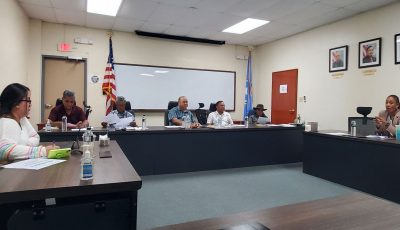IN THE BSI/IPI SUIT TO STAY REVOCATION OF CASINO LICENSE
CCC seeks denial of IPI bid for preliminary injunction
Because a settlement agreement has yet to be executed between the Commonwealth Casino Commission and the Saipan casino operator, the CCC now wants to resume proceedings to strip Imperial Pacific International (CNMI) LLC’s of its exclusive casino license.
Acting on behalf of the CCC, assistant attorneys general Keisha Blaise and Alison Nelson filed Friday an opposition to IPI’s initial motion for a preliminary injunction to stay revocation proceedings in IPI’s casino license.
According to the 24-page opposition filed by the two lawyers in the U.S. District Court for the NMI, they noted that the basis of IPI and its sister company, Best Sunshine International’s, initial motion is that Section 30 of the Casino License Agreement requires arbitration, or an alternate resolution outside court, of IPI’s force majeure defense.
IPI’s force majeure defense is that it could not carry out its financial obligations under the CLA as a result of Super Typhoon Yutu, followed by the COVID-19 pandemic, which negatively impacted their business.
However, the lawyers argue that IPI’s motion should be denied based on the plaintiffs’ failure of proof as to each of the four factors necessary for such extraordinary relief: likelihood of success on the merits, irreparable harm, balance of hardship, and advancement of the public interest.
As to the merits, the lawyers argue that plaintiffs fail to prove likelihood of success on the merits in numerous respects.
First, the arbitration provision in the CLA does not apply to the enforcement actions because those actions seek to enforce violations of Commonwealth law and regulations, not conditions that arise under the CLA, the lawyers stated.
Second, CCC’s counsels said that the dispute resolution provisions in the CLA that provide for arbitration do not apply to revocation proceedings.
“To the contrary, the CLA explicitly states that the dispute resolution process does not apply to revocation proceedings,” they said.
Third, even if the arbitration clause applied to revocation proceedings, the arbitration anticipated by the CLA is not available.
“In any event, IPI waived its right to arbitration when it answered the complaint, pleaded its affirmative defenses (but failed to raise arbitration as a defense at that time), and requested a hearing before the commission,” the opposition said.
Another deficiency in the plaintiffs’ motion, the CCC lawyers stated, is plaintiffs’ failure to show irreparable harm.
“Plaintiffs’ alleged harm arises from plaintiffs’ alleged inability to present its force majeure argument to the commission and the court, its speculation that the commission’s decision on such an argument is a foregone conclusion, and its suggestion that revocation of its license would be unwarranted if the purported capital infusion is made,” the opposition said.
Finally, CCC’s lawyers argue that plaintiffs also cannot prove that the balance of hardship tips decisively in their favor or that the public interest supports an injunction.
“The injunction plaintiffs seek would cause significant harm to defendant as the resulting delay would hinder its funding, thereby crippling its ability to regulate and grow the casino industry in the Commonwealth and would harm the Commonwealth for the same reasons. For all these reasons and those explained below, the CCC respectfully requests that the preliminary injunction be denied,” the motion stated.
BSI and IPI filed their motion for preliminary injunction eight months after CCC executive director Andrew Yeom filed five enforcement actions against IPI and over a year after the commission ordered, after two evidentiary hearings, that IPI’s license was suspended indefinitely.
A settlement agreement has been in the works for over a month. In a previous hearing before the court, IPI, BSI, and CCC previously informed the court that a settlement agreement was to finalized and executed by July 18, but as of press time, no settlement has been executed.



























